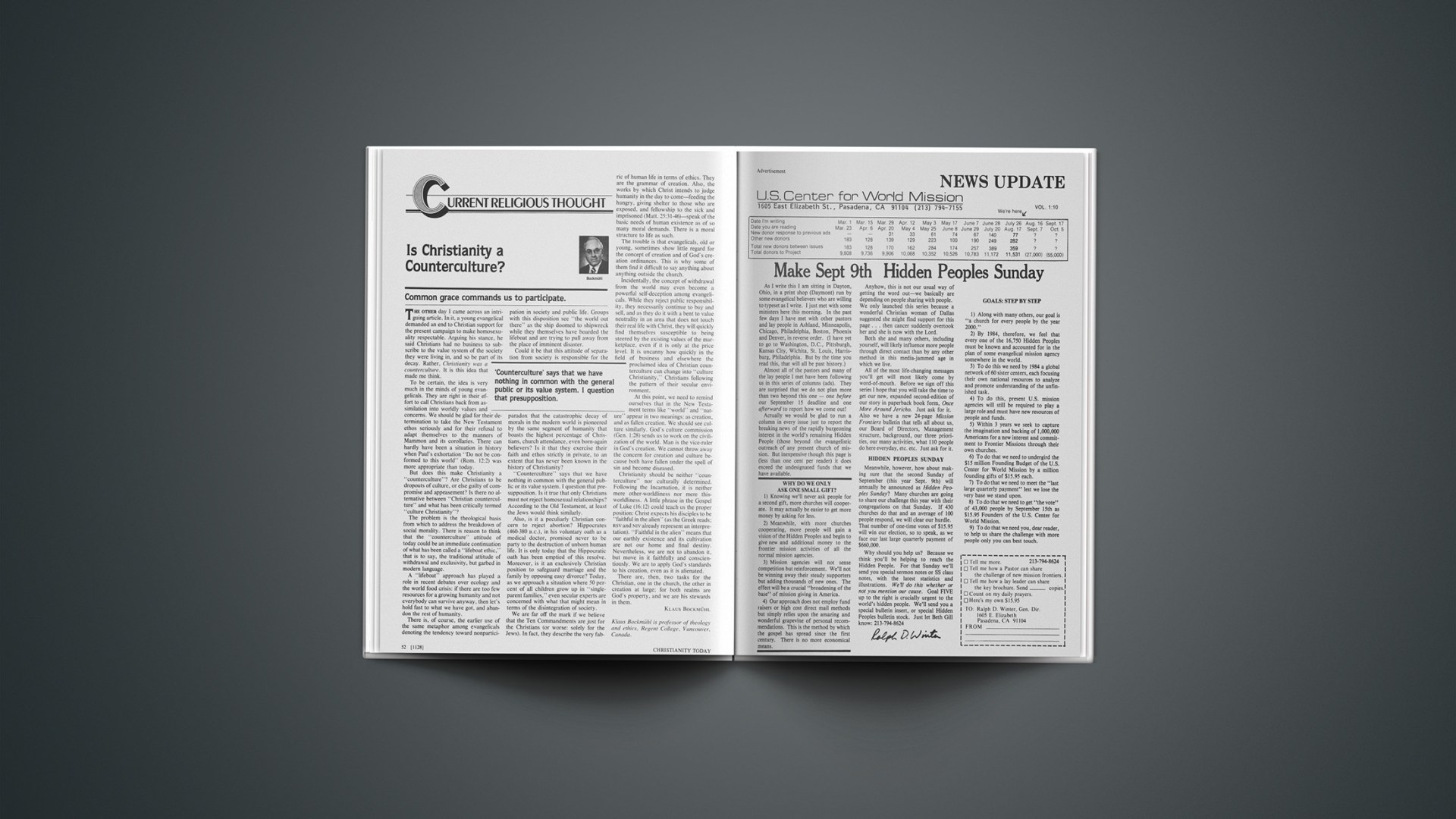Common grace commands us to participate.
The other day I came across an intriguing article. In it, a young evangelical demanded an end to Christian support for the present campaign to make homosexuality respectable. Arguing his stance, he said Christians had no business to subscribe to the value system of the society they were living in, and so be part of its decay. Rather, Christianity was a counterculture. It is this idea that made me think.
To be certain, the idea is very much in the minds of young evangelicals. They are right in their effort to call Christians back from assimilation into worldly values and concerns. We should be glad for their determination to take the New Testament ethos seriously and for their refusal to adapt themselves to the manners of Mammon and its corollaries. There can hardly have been a situation in history when Paul’s exhortation “Do not be conformed to this world” (Rom. 12:2) was more appropriate than today.
But does this make Christianity a “counterculture”? Are Christians to be dropouts of culture, or else guilty of compromise and appeasement? Is there no alternative between “Christian counterculture” and what has been critically termed “culture Christianity”?
The problem is the theological basis from which to address the breakdown of social morality. There is reason to think that the “counterculture” attitude of today could be an immediate continuation of what has been called a “lifeboat ethic,” that is to say, the traditional attitude of withdrawal and exclusivity, but garbed in modern language.
A “lifeboat” approach has played a role in recent debates over ecology and the world food crisis: if there are too few resources for a growing humanity and not everybody can survive anyway, then let’s hold fast to what we have got, and abandon the rest of humanity.
There is, of course, the earlier use of the same metaphor among evangelicals denoting the tendency toward nonparticipation in society and public life. Groups with this disposition see “the world out there” as the ship doomed to shipwreck while they themselves have boarded the lifeboat and are trying to pull away from the place of imminent disaster.
Could it be that this attitude of separation from society is responsible for the paradox that the catastrophic decay of morals in the modern world is pioneered by the same segment of humanity that boasts the highest percentage of Christians, church attendance, even born-again believers? Is it that they exercise their faith and ethos strictly in private, to an extent that has never been known in the history of Christianity?
“Counterculture” says that we have nothing in common with the general public or its value system. I question that presupposition. Is it true that only Christians must not reject homosexual relationships? According to the Old Testament, at least the Jews would think similarly.
Also, is it a peculiarly Christian concern to reject abortion? Hippocrates (460–380 B.C.), in his voluntary oath as a medical doctor, promised never to be party to the destruction of unborn human life. It is only today that the Hippocratic oath has been emptied of this resolve. Moreover, is it an exclusively Christian position to safeguard marriage and the family by opposing easy divorce? Today, as we approach a situation where 50 percent of all children grow up in “single-parent families,” even secular experts are concerned with what that might mean in terms of the disintegration of society.
We are far off the mark if we believe that the Ten Commandments are just for the Christians (or worse: solely for the Jews). In fact, they describe the very fabric of human life in terms of ethics. They are the grammar of creation. Also, the works by which Christ intends to judge humanity in the day to come—feeding the hungry, giving shelter to those who are exposed, and fellowship to the sick and imprisoned (Matt. 25:31–46)—speak of the basic needs of human existence as of so many moral demands. There is a moral structure to life as such.
The trouble is that evangelicals, old or young, sometimes show little regard for the concept of creation and of God’s creation ordinances. This is why some of them find it difficult to say anything about anything outside the church.
Incidentally, the concept of withdrawal from the world may even become a powerful self-deception among evangelicals. While they reject public responsibility, they necessarily continue to buy and sell, and as they do it with a bent to value neutrality in an area that does not touch their real life with Christ, they will quickly find themselves susceptible to being steered by the existing values of the marketplace, even if it is only at the price level. It is uncanny how quickly in the field of business and elsewhere the proclaimed idea of Christian counterculture can change into “culture Christianity,” Christians following the pattern of their secular environment.
At this point, we need to remind ourselves that in the New Testament terms like “world” and “nature” appear in two meanings: as creation, and as fallen creation. We should see culture similarly. God’s culture commission (Gen. 1:28) sends us to work on the civilization of the world. Man is the vice-ruler in God’s creation. We cannot throw away the concern for creation and culture because both have fallen under the spell of sin and become diseased.
Christianity should be neither “counterculture” nor culturally determined. Following the Incarnation, it is neither mere other-worldliness nor mere this-worldliness. A little phrase in the Gospel of Luke (16:12) could teach us the proper position: Christ expects his disciples to be “faithful in the alien” (as the Greek reads; RSV and NIV already represent an interpretation). “Faithful in the alien” means that our earthly existence and its cultivation are not our home and final destiny. Nevertheless, we are not to abandon it, but move in it faithfully and conscientiously. We are to apply God’s standards to his creation, even as it is alienated.
There are, then, two tasks for the Christian, one in the church, the other in creation at large; for both realms are God’s property, and we are his stewards in them.
Klaus Bockmühl is professor of theology and ethics, Regent College, Vancouver, Canada.










